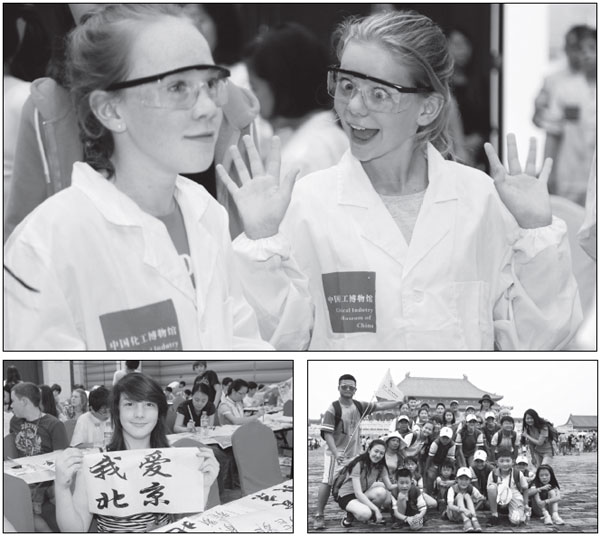Bluestar's annual summer camp fires imaginations and integration
|
Top: Children of the Bluestar summer camp do interesting chemistry experiments during an activity called the Molecular Republic on July 29. Left: A foreign camper learns Chinese calligraphy in 2011. Right: International campers visit the Forbidden City in 2015. Photos provided to China Daily |
When China National Bluestar (Group) Co Ltd decided to organize a summer camp for its employees' children, it didn't expect that the event would still be going strong 26 years later.
"Four years ago, I sent my son to the summer camp and when he came back, he told me this experience made him a stronger person," Jim Blum, an American employee of Bluestar, told China Daily. "He wrote about his experience at the camp as part of his college application."
Bluestar is a subsidiary of China National Chemical Corp, one of the country's top chemical product manufacturers.
"The summer camp was initially established to look after our employees' children during the summer vacation period, when their parents would often leave home to go on business trips," said Gao Jianjun, vice-president of Bluestar.
In 2006, Bluestar began its series of overseas mergers and acquisitions, starting with the purchase of Adisseo in France, followed by Qenos in Australia, BSI, also in France, and Elkem in Norway. In 2009, the company's annual summer camp was open to the children of overseas employees as a way to accelerate internationalization.
"Now the summer camp has become a bridge to integrate different cultures during the process of corporate restructuring," Gao said.
Every year, the camp has a particular theme, and this year's theme is "inclusiveness", which refers not only to the individual camp participants, but also to the broader blending between the East and the West.
The theme of inclusiveness is clearly illustrated by a series of pictures drawn by younger participants that are hanging on the wall of Beijing No 1 campsite, which held its opening ceremony in the capital on July 20.
The pictures show children standing hand-in-hand and feature the word "inclusiveness" written in Spanish, Germany, Slovak and Chinese pinyin. Writing in English, one girl afirmed: "Whatever nationality, whatever skin color, whatever language, we are family."
The summer camp usually lasts for 21 days and is open to children aged between 8 and 15. This year there are 18 sub-camps hosted in 13 provinces and two municipalities around China and among the 880 participants, 48 are from overseas.

As the city where the enterprise's headquarters is located, Beijing has three campsites. The 140 campers in Beijing No 1 camp have been divided into five classes, each equipped with about 10 teachers, including assistant teachers that help arrange indoor classes, coaches that work to ensure children's safety in outdoor activities and interpreters who facilitate communication among Chinese and foreign campers, according to Li Huili, head of the Bluestar summer camps.
This year, the activities range from outdoor exercises such as skiing, rugby and sightseeing to indoor activities including masquerades, language studies and chemical experiments, which have been carefully designed by experts from the Beijing Education Commission, said Li.
The camp also features the traditional International Family Day, where every foreign child at the summer camp is taken to the home of a Chinese camper to experience a slice of real local family life.
"Today, we welcomed to our home the two youngest French kids at camp, Calypso and Nesrine, neither of whom can speak English," the father of a Chinese camper wrote in a parents' diary on International Family Day. "Although neither of us speak French, somehow we made ourselves understood through a combination of body language and eye contact.
"The kids played in the park and my wife and I happily participated in their games. Languages are no barrier. What really matters is the communication between souls," he wrote.
The diary also recorded the moments when Calypso and Nesrine made dumplings, wrote brush calligraphy and learnt tai chi dance.
"The summer camp helps foreigners see China through the eyes of children," said Wu Min, director of Bluestar's public relations department. "With the internalization of the enterprise, the camp also provides a platform for employees from different countries to learn more about each other's culture," Wu said, adding that the safety of all participants is of primary importance to Bluestar.
"We even have anti-slip and anti-collision strips in the kids' rooms. After all, safety is our priority," Wu said.
According to the Parent Handbook of Beijing No 1 camp, foreign campers are taught to bandage wounds, perform mouth-to-mouth resuscitation and undertake fire drills in the first two days alone. "The aim is to enhance safety awareness," Wu said.
Foreign campers also learn simple words and phrases in Chinese, as well as how to use chopsticks, to help them adapt to their new environment. The organizers also prepare Chinese dishes alongside typical Western food to ensure that different tastes are catered for.
Pan Yan, the head teacher of Class 4, recalled the sense of excitement among the foreign children: "We don't need to wake them up in the morning since many of them are already out of bed at 4 or 5 am."
Jade Fisher, a 13-year-old Australian girl participating in Beijing No 1 camp, said the Chinese buildings and decorations impressed her most. "We visited the Great Wall and the Forbidden City. I've made some Chinese friends here and we really have fun," she said.
The camp's closing party is planned for Tuesday when campers will give a final performance. "In previous years, many kids burst into tears at the (final) party. They find it so hard to say goodbye," the head of the summer camp said.
Chen Meiling contributed to this story.
zhuanti@chinadaily.com.cn
(China Daily 08/09/2016 page14)













